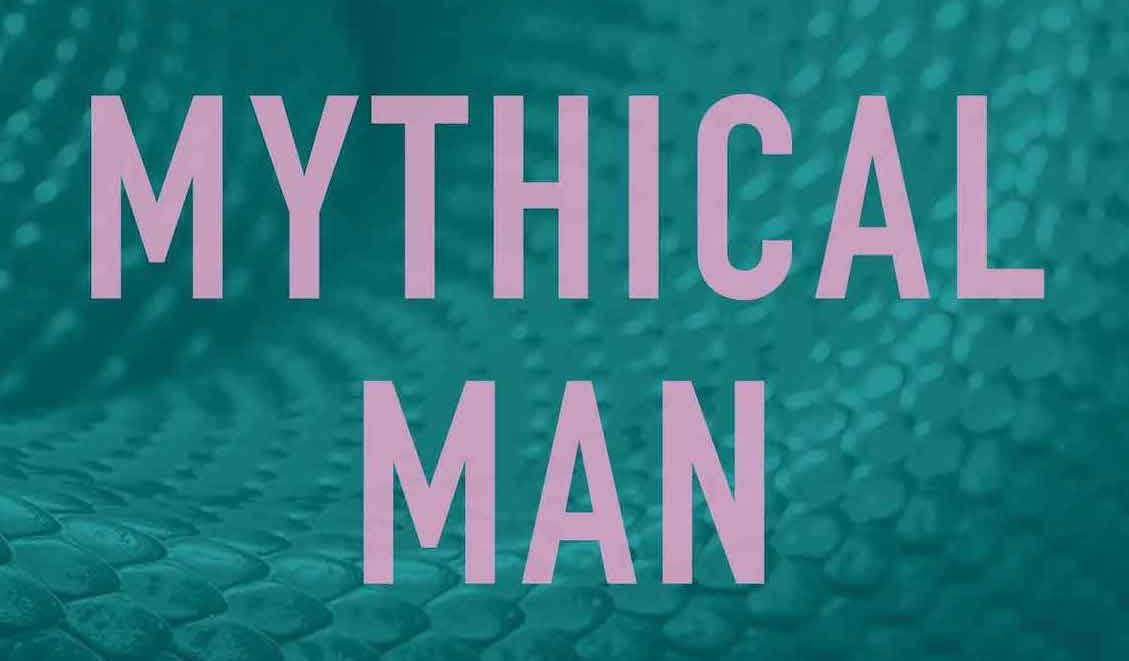
Mythical Man
David Ly
Palimpsest Press, 2020
Review by Hasan Namir
There, viper scales
frame
a smoky-eyed stare––
you never know where the gaze
will strike
David Ly’s debut poetry collection, Mythical Man, opens with the title poem, “Mythical Man I.” The poem, shaped like a slithering snake, begs to be examined from various angles––and so I did. When I read the poem sideways, I see the shape of the mythical character Ly illustrates. When reading from top to bottom, I notice Ly’s brilliant choice of words, such as “enviable silhouette” and “a taxidermic bird-of-paradise.”
I’ve been a fan of Ly’s work since his wonderful chapbook Stubble Burn. I really appreciate how, in Mythical Man, Ly expands on the themes he introduced in the chapbook. Ly draws out and then destroys myths, contending with topics like racism, family, his grandpa’s traditional perspective on life, and desire. Shape-shifting is prevalent throughout, through concrete poetry, in the way words are used in new and surprising ways, and in the pulsing desire for the body to be destroyed or transformed.
Several of Ly’s poems break through the myths that racism doesn’t exist in queer communities through blunt yet poetic depictions of the narrator’s experience of dating (often online).
But you delete
the app, briefly, re-downloading
discovering you’re still
only desired when they lust
for a vacation in your sin,
eager to gorge on yr oriental noodle.
As a queer Person of Color, I relate immensely to Ly’s poems, especially in the way queer People of Color are further marginalized when it comes to dating.
1 kilometre away
In white gay men
In how I’m not a racist
[…]
In straight up racism
[…]
In a chat that suddenly goes silent
In typing hey but fully expecting to be ignored
In the anxiety of approaching men.
An anxiety lies in the fear of being seen as something exotic. But, Ly’s poems blatantly resist such exoticization:
This poem is not exotic.
this poem is not exotic.
[…]
this mouth is not exotic
this voice is not exotic
this poem is not exotic
this poem is not exotic.
Some of the poems in the book highlight the struggle of reconciling between two places and identities. In the poem, “Nod and Be Polite,” the narrator’s grandfather “asked when I will get a girlfriend…”
Again
Reminding grandpa that I won’t ever have one
Again
Being told how going to Vietnam for a wife is the norm
Again here
I’m from here.
Again, there is a struggle in the anxiety of belonging within spaces. The repetitions in the poems are constant reminders to act certain way, whether “to add sugar” or speak “less sweet,” over and over again. Similarly, the repeated use of the word “like” in “Post One” and “Post Two” illustrate an on-going conflict between fantasy and reality, whether through a social media filter or a gay dating app.
The desire to be liked is prevalent on the page, shown through a misguided social media persona that focuses so much on the likes. Ly brilliantly repeats the likes on the page to show the irony between authentic desire and performative likability.
Sometimes, words are used in new, creative ways: In the poem “EVIL,” Ly uses “honey” as a verb:
Evil takes your virginity
with the beat dropping in the song you forgot was playing in the background
it honeys sweet tea the morning after
drinks it in front of you.
Ly’s poems shape-shift throughout the book, as they describe physical transformation. For example, in the poem, “In The Back Of the Sunfire”––
But when I catch my breath,
summer slips away
like the sensation of your body
sliding out of mine
––the shape is one thing is coming out of something else, whereas in “Mythical Man (II),” there is an emphasis on being closed and whole, refusing growth:
I’ll need to cauterize
each wound
to prevent
our dreams
from regrowing,
distractions
from the real magic
that makes us
powerful
on our own.
In Mythical Man, every word is chosen with immense thought. Words are used with new meanings, and repetition is used with powerful irony. Every page turned from the book, I was amused, charmed and surprised.
This debut collection proves that Ly is an unforgettable voice that we need in literature. His writing is raw, eloquent, and authentic. What Ly achieves in his debut full-length poetry book is quite an accomplishment in itself and I hope more people meet Mythical Man as they will learn that this is, as Ly himself says so eloquently:
beyond belonging,
beyond what is understood,
what can be created or destroyed.
Iraqi-Canadian author Hasan Namir graduated from Simon Fraser University with a BA in English and received the Ying Chen Creative Writing Student Award. He is the author of God in Pink (2015), which won the Lambda Literary Award for Best Gay Fiction and was chosen as one of the Top 100 Books of 2015 by The Globe and Mail. His work has also been featured on Huffington Post, Shaw TV, Airbnb, and in the film God in Pink: A Documentary. He was recently named a writer to watch by CBC books. Hasan lives in Vancouver with his husband. War/Torn (2019, Book*Hug) is his latest poetry book. His children’s book, The Name I Call Myself, will be published by Arsenal Pulp Press in October of this year.